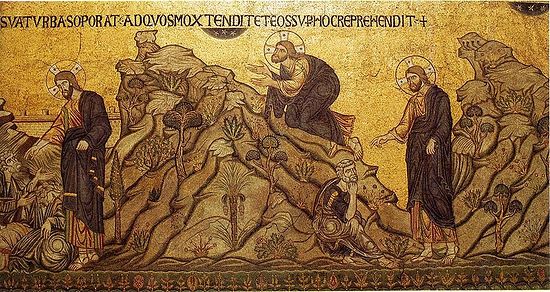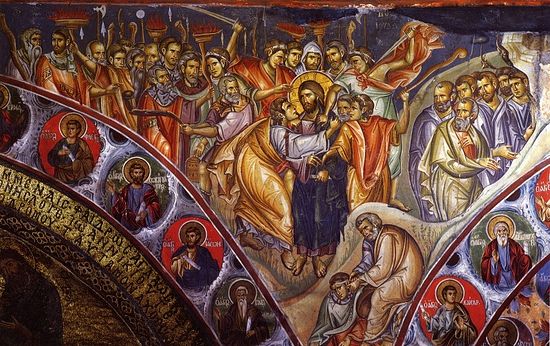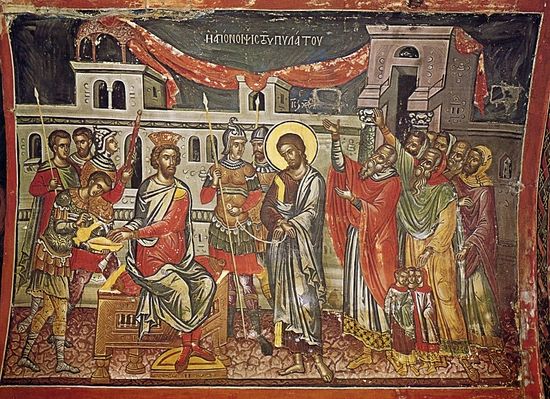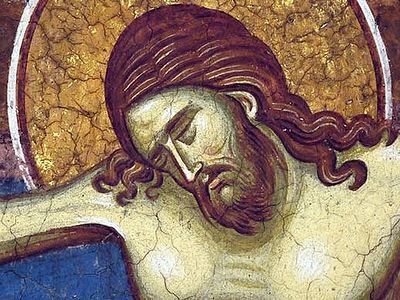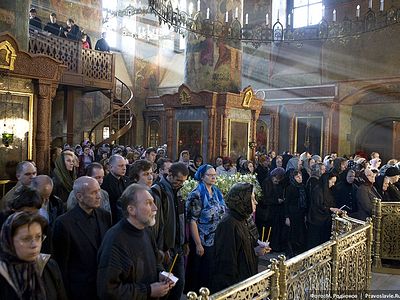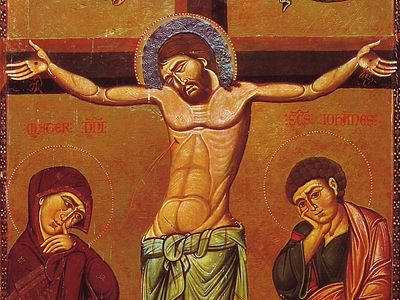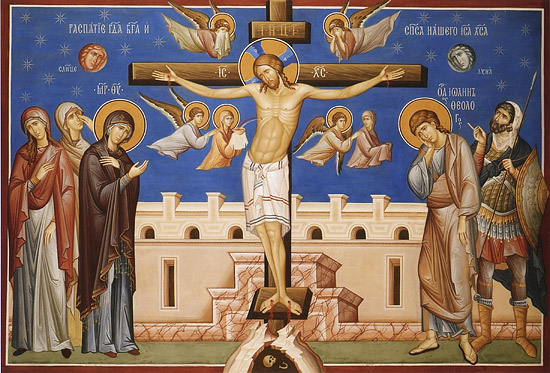
The central event in the history of mankind is the coming into the world of our Lord Jesus Christ, and the most important deed—His voluntary suffering and death on the cross, culminating in the glorious Resurrection from the dead.
The services of the Holy Week aim to revive the meaning of Christ’s martyrdom on the Cross in the consciousness of the devout, in order that we may feel the greatness of His love towards us more deeply and, in turn, try to love Him more. For this reason everything that is only pre-depicted in the Old Testament, and that which directly concerns the Savior’s suffering on the Cross in the New Testament, the Holy Church reveals to the spiritual view of those praying in the touching services of the pre-Easter week, which is also called Passion Week because of the sufferings of the Savior. Each service of this week is unique in its Gospel remembrances, in its melodies, prayers and holy rites. And here the Church initiates the faithful into great spiritual abundance, not only in its inner content, but also in its external form. These services were conceived and perfected in the course of centuries through the efforts of many talented church writers, poets and composers.
In this article, we will relate the events of the last days of the earthly life of the Lord Jesus Christ, explain the central moments of the Passion services and present the texts of several of the chants.
Upon completing the Last Supper and having given communion to His disciples, the Lord Jesus Christ went with them into the garden of Gethsemane. This was on Thursday evening, the day before the Jewish holiday of Passover. The cozy garden of Gethsemane, thickly planted with olive trees, once belonged to the ancestor of the Lord, King David. Situated on the western side of the Mount of Olives, the garden rose above Jerusalem, and offered a picturesque view of the Temple and the surrounding splendid buildings. When the Lord visited Jerusalem, He invariably went to Gethsemane with his disciples. Knowing this, Judas, one of the apostles (the one who left the Last Supper in order to betray the Savior) decided to lead the soldiers here specifically, in order that they may arrest Christ.
Knowing of the soldiers’ approach, the Lord began to prepare for the upcoming judgment before the high priests and to His death on the cross. Feeling the necessity of prayer in this decisive moment, the Lord told His apostles: "Sit here, while I go and pray yonder." Withdrawing a short distance, the Lord began to be sorrowful and very heavy. " My soul is exceeding sorrowful, even unto death," He said to the Apostles Peter, James and John, who were near. "Tarry ye here, and watch with Me." Then, stepping a little farther away, He fell on His face and began to pray: "O my Father, if it be possible, let this cup pass from Me: nevertheless not as I will, but as Thou wilt." This prayer was so intense, according to the evangelists, that perspiration, like drops of blood, dripped from His face to the ground. At this moment of inconceivable inner conflict an Angel appeared to Jesus from Heaven and began to strengthen Him.
No one can comprehend the total weight of the Savior’s sorrow when He was preparing for His sufferings on the Cross for the salvation of sinful humanity. There is no need to deny the natural fear of death, because to Him as a human, all the habitual human sorrows and ills were known. It is natural for normal humans to die, but for Him, being completely without sin, death was an unnatural state.
Besides this, the internal sufferings for Christ were particularly unbearable because at this time the Lord was taking on Himself the backbreaking weight of humanity’s sins. World evil with all its backbreaking heaviness as if pressed down upon the Savior and filled His soul with unbearable sorrow. To Him, as One morally perfect, even the slightest evil was alien and loathsome. Taking human sins on himself, the Lord took the blame for them upon Himself as well. In this manner, that which each person should have suffered for his transgressions was now concentrated on Him alone. Evidently, Christ’s sorrow grew from the knowledge of how callous people had become. Many of them will not only appreciate His eternal love and greatest act, but will laugh at Him and maliciously deny the righteous path offered them. They will prefer sin to the righteous way of life, and they will pursue and kill those people who will hunger for salvation.
Thus suffering, the Lord prayed thrice. The first time He asked the Father to let the cup of suffering pass from Him; the second time He declared His readiness to do the will of the Father; after the third prayer the Savior said: Let thy will be done!
From a theological point of view, the internal conflict which the Lord Jesus Christ suffered in the garden of Gethsemane, surely reveals the two independent and complete beings within Him: the Godly and the human. His Godly will was in complete accord with the will of His Heavenly Father, desiring to save people through His sufferings, but His human will naturally shunned death as the destiny of sinners and desired to find another path for human salvation. In the end, strengthened by diligent prayer, His human will submitted to His Godly will.
Arising from prayer, the Lord went to the apostles in order to warn them of the traitor’s approach. Finding them asleep, He meekly rebukes them: Sleepest thou? Couldest not thou watch one hour? Behold, the Son of man is betrayed into the hands of sinners. Watch ye and pray, lest ye enter into temptation. The spirit truly is ready, but the flesh is weak (Mark 14:38). How could the disciples fall asleep at such a decisive moment? This occurred, apparently, through overwhelming grief. They dimly comprehended that some horrible tragedy would occur at any time, and did not know how to avoid it. It is a known fact, that great emotions can so weaken the nervous system, that a person loses the will to combat it and tries to lose himself in sleep.
Still, the Lord tries to convince His pupils, and through them all Christians, not to despair no matter how difficult the situation, but to keep vigil and pray diligently. God, seeing the person’s faith, will not permit the one counting on Him to fall into temptations beyond his strength, but will surely help him.
The Arrest
At this time, the silence of the garden was shattered by the sound of the invading mob. A detachment of Roman soldiers arrived, headed by Judaic leaders and empowered by the high priests. Many different people were also with them, thirsting for spectacles. Judas, one of the twelve apostles, turning traitor, brought the mob. For his treachery the high priests gave him thirty silver pieces—a comparatively small sum: for this price one could purchase a slave at the market.
Although there was a full moon, the crowd brought torches, assuming that the Lord would try to hide in the darker parts of the garden. Expecting resistance, the soldiers brought sabers, and the servants—sticks. The high priests, fearing the indignation of the people, commanded Judas to show caution at Jesus’ arrest. The crowd accompanying Judas did not know exactly who would be arrested. They only knew there was a command to take Him, Who is pointed out by Judas. Judas, then, keeping his mission secret, limited himself to the following command: "Whomsoever I shall kiss, that same is he; take him, and lead Him away safely" (Mark 14:44).
It can be supposed that Judas was planning to leave the division and run ahead, approach Jesus with the usual greeting, kiss Him, and them stand to the side and let it appear that he does not know what is happening. But his plan did not succeed. When he approached Jesus and babbled in bewilderment: "Master, master," then Jesus asked him straight out: "Friend, wherefore art thou come?" Not knowing what to reply, Judas in confusion said: "Hail, master," and kissed Him. The Lord rebuked Judas for this heinous kiss, saying, "Judas, betrayest thou the Son of man with a kiss?"
When the mob approached, the Lord asked: "Whom seek ye?" The Judaic leaders, who knew for Whom the division was sent, answered: "Jesus of Nazareth." "I am He!" loudly answered Christ. Those coming to arrest Him were told to do so cautiously, because He has many followers who could defend Him. And suddenly He openly and fearlessly declares "I am He!" The Lord said this with such power, that His enemies stepped back and fell to the ground from stupefaction. When they had somewhat recovered and stood up, the Lord asked once again: "Whom seek ye?" They repeated, "Jesus of Nazareth." The Lord told them again, tempering his Godly power, "I have told you that I am He: if therefore ye seek Me, let these (the apostles) go their way." The Lord’s care for his disciples was touching. From the first day that they were called, the Savior protected them from any danger, as is seen in His high-priest prayer to God the Father: "Of them which Thou gavest me have I lost none."
So the guard, leaving the Apostles alone, arrested the Lord Jesus. Here the fervent Apostle Peter, not awaiting the answer to the question: Shall we smite with the sword? pulled out a knife and, hitting the servant of the High Priest, Malchus, cut off his right ear. The Lord healed him immediately with one touch, saying to Peter, Put again thy sword into his place: for all they that take the sword shall perish with the sword. This, of course, is not a prophecy, but only a general law of God’s truth: he who wants to fight with an evil weapon should expect a like reply. A similar idea is expressed in the Old Testament law: Whose sheddeth man’s blood, by man shall his blood be shed (Gen. 9:6). The Lord added to this: Thinkest thou that I cannot now pray to my Father, and He shall presently give more than twelve legions of angels? (Matt. 26:53). The Romans called a legion a detachment consisting of 10,000 soldiers. The entire Angelic host would arise in defense of the Son of God, if He did not voluntarily give Himself up to suffering. The Lord as if contrasts the twelve legions to His twelve disciples.
Turning to the Judaic leaders, Christ said: Be ye come out, as against a thief, with swords and staves? … But this is your hour, and the power of darkness (Luke 22:53). After this the disciples ran, abandoning Him. Only the apostles Peter and John remained and followed the departing detachment leading Jesus from afar. Thus they arrived at Jerusalem.
The Judgment of the Lord by the High Priests
The bound Savior was led in the house of the high priests, who were found in Zion, a rich neighborhood in upper Jerusalem. (Zion is southeast of the Temple, where the palace of King David once stood. During the time of the Savior, the Judaic leaders and aristocracy lived in Zion. Here also was located the house with the large room, where the Lord held the Last Supper. The house was spacious, with many buildings, placed on the periphery of a large courtyard). The leading high priest was Caiaphas, and Annas was his father-in-law. (Caiaphas was a nickname. His real name was Joseph. He held the position of high priest from the 18th to the 35th year AD. In 1993, in the family mausoleum of the high priests, at a distance of half a kilometer to the south of the temple, archaeologists found a beautifully carved sarcophagus with the bones of a person called Caiaphas, written on the outside of the sarcophagus. It is presumed that this is that Caiaphas who is mentioned by the Evangelists). Although Annas was removed from his post, he continued to live in the high priests’ house, and his opinion, as the opinion of an older and more experienced high priest, was respected. Annas questioned the Lord initially, after which Caiaphas led the formal suit.
The sly Annas began to ask Christ, what He taught and who were His disciples. With this he meant to give a criminal tone to the judicial suit that followed, casting doubt on Jesus as the leader of some conspiracy, with secret teachings and secret goals. The Lord immediately deflected the possibility of such an accusation, pointing out to Annas: I spake openly to the world; I ever taught in the synagogue, and in the temple, whither the Jews always resort; and in secret have I said nothing—and as proof of this He suggested asking witnesses who consistently listened to Him. Although there was nothing offensive in this reply, one of the servants, apparently desiring to please the high priest, slapped the Lord on the cheek, saying: Answerest the high priest so? In order to bring the servant to his senses, the Lord meekly counseled him: If I have spoken evil, bear witness of the evil: but if well, why smitest thou me?—that is, if you can prove, that I taught the people something bad, then prove it, but do not hit without reason.
Completing the preliminary questioning, Annas sent the bound Jesus to the high priest Caiaphas. By this time elders, scribes, noted Pharisees and almost the entire Sanhedrin had gathered at Caiaphas’s. Notwithstanding the late hour, they hurried to gather evidence against Jesus, in order to prepare all that was necessary for the other, full gathering of the Sanhedrin in the morning, at which they could officially pronounce His death sentence. They invited false witnesses for gathering accusations, who began to accuse Christ of different breaches of the law (for example, not observing the Sabbath). Finally, two witnesses came, who pointed out the words, pronounced by the Lord when he chased out the sellers from the Temple. In doing so, they modified the words of Christ with ill intent, giving them a different meaning. The Lord said: "Destroy this temple (my Body), and in three days I will raise it up" (John 2:19). He did not say the He would destroy the Temple in order to raise it later—as was asserted at the trial by the false witnesses.
But even this boast as assigned to Christ was not enough for a serious punishment. Jesus did not even try to refute these absurd and confused accusations. Christ’s silence irritated Caiaphas, and he decided to extract an admission from the Lord which would give a reason for giving him the death sentence as a blasphemer. According to the trial habits of the time, he turned to the Lord with the formally worded question: I adjure Thee by the Living God, that Thou tell us whether Thou be the Christ, the Son of God. This trial-formula entreaty demanded that the accused definitively answer the absolute truth, calling God as his witness. To such a directly placed question, under oath, the Lord could not not answer. No longer concealing His Messianic and Godly dignity, Chirst answered: Thou hast said!, that is: "Yes, you truly said, that I—am the promised Messiah, and added: Hereafter shall ye see the Son of man sitting on the right hand of power, and coming in the clouds of heaven. This is a reference to the 110th Psalm and to the vision of the prophet Daniel. In the aforementioned Psalm, the Messiah is pictured sitting on the right hand of God. The Prophet Daniel saw the Messiah in the image of the Son of man, coming on heavenly clouds. (In the 110th Psalm it is written: The Lord (God the Father) said unto my Lord (the Messiah), Sit Thou at My right hand, until I make Thine enemies Thy footstool… in the beauties of holiness from the womb of the morning: Thou has the dew of Thy youth. The description of the prophet Daniel: I saw in the night visions, and behold, one like the Son of man came with the clouds of heaven, and came to the Ancient of days, and they brought Him near before Him. And there was given Him dominion, and glory, and a kingdom, that all people, nations, and languages should serve Him: His dominion is an everlasting dominion, which shall not pass away, and His kingdom that which shall not be destroyed (Daniel 7:13-14).
With these references to the Holy Scriptures the Lord confirmed that He is the promised Messiah and Son of God. Then the high priest rent his clothing and exclaimed: He hath spoken blasphemy. The tearing of clothing by the Jews expressed great sadness or indignation. High priests were forbidden to tear their clothing. Such a dramatic gesture was designed to underline that Caiaphas was so outraged by Christ’s declaration that he even forgot the existing ban.
What think ye?—asks Caiaphas those present, and receives the desired answer: He is guilty of death. Upon declaring this verdict, the heretofore decorously seated judges turned into a ferocious mob and attacked Christ. No longer hiding their hatred, they began to mock Him and spit in His face. Others hit Him on the face and head, asking mockingly: Prophesy unto us, thou Christ, who is he that smote Thee? They revealed through their behavior, that the entire trial was only a crude farce, under which was hidden their personal hatred against Christ. They are no longer the guardians of the Law of God, but a rabble blinded by envy.
The Apostle John, as a fisherman, was known to the family of the high priest, and he was freely permitted to enter the courtyard. John also took Peter with him. As it was cold, a campfire was lit in the courtyard, around which were seated soldiers and servants. Apparently, the Apostle Peter also approached the fire from time to time, in order to warm himself. At this point several of the servants recognized Peter and began to accuse him of being one of Christ’s disciples, but Peter began to assure them that he never knew the man. Later, someone else again accused Peter of being Christ’s disciple. A third time, already in the wee hours of the morning, when several servants with greater persistence again began to accuse Peter of being Christ’s disciple, he became greatly frightened and began to swear that he never knew Him. At this time the rooster crowed. Then Peter remembered the prophecy of the Savior about the rooster and, ashamed of his cowardice, went out on the street and cried bitterly.
The Verdict of the Sanhedrin
The first session of the Sanhedrin, begun in the house of Caiaphas Thursday night, was concluded early morning Friday. The second session was called several hours later in the grand building of the Sanhedrin, located somewhat south of the Temple. In the Talmud, where the ancient Jewish laws are collected, it is said that in criminal cases the final declaration of the verdict must be made no earlier than the day after the beginning of the trial. But neither Caiaphas nor the members of the Sanhedrin wanted to delay the process. In order to at least give the appearance of a second trial, the Sanhedrin gathered the next morning—already in full attendance. Soldiers brought the bound Jesus Christ to this second meeting, who passed these hours between trials in the courtyard of the high priest, undergoing humiliation at the hands of the guard and servants.
The Lord Jesus Christ was led into the meeting of the Sinhedrin and was again asked: Art Thou the Christ? It was important to have the new members of the Sinhedrin to hear the admission of Jesus personally, that He considers Himself the promised by the prophets Messiah. Knowing that the trial was called only as a formality and that His fate was already pre-decided, the Lord answered: If I tell you, ye will not believe: and if I also ask you, ye will not answer me, nor let me go. Art thou then the Son of God?—reiterated the judges, and the Lord as if unwillingly confirmed: Ye say that I am. This was the formal expression of the accused’s assent—specifically that, which the accusers desired to hear. Pleased with the answer, the members of the Sanhedrin declare unnecessary further examination of the case and pronounce their verdict of committing the Lord Jesus Christ to Roman rule—Pontius Pilate—for carrying out the death sentence.
The Lord Jesus Christ on trial before Pilate
After the verdict, the Judaic leaders hurried to lead the Lord Jesus Christ to Pontius Pilate. From the time of Judea’s subjugation by the Romans, the right of the Sanhedrin to execute criminals was taken away. For this reason, it was necessary that the Roman leader carry out the pronounced sentence.
Pontius, also called Pilate, was the fifth leader (procurator) of Judea. He was assigned to this post in 26 AD by order of the Roman emperor Tiberius. Arrogant and cruel, though cowardly as well, he despised the Jews and, in turn, was despised by them. The procurators’ residence was located in Caesarea (on the shore of the Mediterranean Sea, eighty kilometers to the north of Jerusalem). Procurators came to Jerusalem only during great holidays to keep order.
The Jews led Jesus into the Praetorium, that is, the judgment hall of the Roman leader, which was found in Antonius’ Fortress, adjoined to the Temple on the northwest side. The Roman garrison resided here. Contact with anything heathen was considered defiling, so the Jewish leaders did not enter the fortress courtyard so that they would not lose the right to celebrate Passover, which was to begin the evening of that same day.
Pilate, conceding to Jewish custom (for the Romans spared the rituals of their conquered nations, in order not to raise them up against them), came out to them personally to the lithostroton (from the Greek lithos—rock), an open platform made of rock before the house of the procurator, and asked: What accusation bring ye against this man?—If he were not a malefactor, we would not have delivered him up unto thee,—answered the leaders. They did not want a new investigation of the Savior’s deeds and hoped that Pilate would immediately confirm their pronounced sentence. But Pilate, sensing the infringement on his power, immediately put them in their place in relation to him as the representative of the emperor: Take ye him, and judge him according to your law. Seeing that their position was hopeless, the Jews quickly switched their proud tone to a submissive one: It is not lawful for us to put any man to death.
Then the leaders were forced to produce their accusations against Christ: We found this fellow perverting the nation, and forbidding to give tribute to Caesar, saying, that he himself is Christ a King (Luke 23:2). The evil hypocrites that themselves hated the Romans came up with this slanderous accusation of a purely political nature, in order to obtain the confirmation of the death sentence. Pilate privately inside the Praetorium asked Jesus: Art thou the King of the Jews?—Sayest thou this thing of thyself, or did others tell it thee of me?—the Lord asks Pilate. It is necessary to know the source of this question. If Pilate himself came to him, then "no" should have been the answer, because Christ never declared himself an earthly king. If Pilate’s question was the reiteration of something the Jews said, then it was necessary to admit that He is truly the King as the Son of God.
Pilate’s answer shows contempt towards Judaism: Am I a Jew? Thine own nation and the chief priests have delivered thee unto me: what hast thou done? He does not assume any kingly merit in Christ, he only wants to know what is His crime. Jesus comforts Pilate that he need fear that He desires earthly power, because My kingdom is not of this world. Expressing doubt in the possibility of the existence of some other unearthly kingdom, Pilate reiterates: Art thou a king then? Then the Lord explains that He is the King of a spiritual Kingdom and came to earth in order to witness Truth—to reveal higher spiritual principles to people. His servants are those who listen to this heavenly teaching. Pilate, as a crude heathen, did not believe in the existence of objective truths or absolute values. What is truth?—he asks scornfully and left, not wishing to continue what he considered a pointless discussion. But Pilate did understand that Jesus was not a threat to Roman power, and thus, on coming to the Jews, announced that he found Him not guilty.
This announcement deeply stung the pride of the Sinhedrin members and they, interrupting each other, began to accuse the Lord of much, desiring at whatever cost to obtain His death sentence. At this time the Lord was totally silent, insomuch that the governor marvelled greatly. Finally the Jews began to accuse Jesus of stirring up the people, teaching throughout the country. Hearing that Christ came from Galilee, Pilate sent Jesus to King Herod, who by reason of the holiday was also in Jerusalem. It was the same Herod, also called Antipas, who beheaded the prophet John the Baptist. It is possible that Pilate hoped to receive more precise information from Herod about the Accused. Most likely he wanted to lay this unpleasant judicial matter at Herod’s feet. Herod, flattered by Pilate’s acknowledgement of his kingly power, became friends with him from that day forth.
Knowing of Christ’s miracles, and thinking that He is the resurrected John the Baptist, Herod hoped to see from some miracle the Lord, to amuse himself these festive days. Upon seeing Jesus, Herod rejoiced and began to ply Christ with many questions. He hoped to hear something interesting from Christ, but Christ remained silent to all his questions. At the same time, the high priests and scribes continually accused the Lord, claiming that His sermon is dangerous to Herod as well as the Roman emperor. Herod did not seriously accept the accusations of the Jewish leaders and, committing outrages against Christ, dressed Him in white clothing and sent Him back to Pilate. According to Roman rituals, those dressed in white were candidates to some leadership or important position (the word candidate, from the Latin candidus, means white, light). Herod in this manner wanted to show that he sees Jesus only as a pitiful fanatic, not as a threat to anyone.
So understood Pilate. Referring to the fact that Herod did not find anything in Jesus deserving of death, Pilate offers to punish Christ, then release Him. With this Pilate wishes to satisfy their hatred. They decisively decline his offer. Then Pilate remembered that the Jews had a custom before Passover of asking the ruler to grant freedom to one of the condemned. Understanding that the leaders betrayed Christ from envy, and counting on support from the common people, Pilate asks the people surrounding the lithostroton: Whom will ye that I release unto you? Barabbas, or Jesus which is called Christ?
While the people began to consult with each other whom to ask for, one more event occurred which influenced Pilate in a positive manner towards the Lord Jesus Christ. While he sat in his judgment seat, a messenger arrived from his wife who asked to tell him: Have thou nothing to do with that just man: for I have suffered many things this day in a dream because of him. Ancient Christian writers call her Claudia Proscula and assert that she professed the Jewish faith, and then became a Christian. Apparently, she saw Jesus Christ in a dream as an innocent righteous man being tortured, and was tormented with the thought that her own husband would become his assassin.
But while the messenger was relating his message to Pilate from his wife, the Jewish leaders hurried to convince the populace to ask for Barabbas. When Pilate asked for the second time: Whether of the twain will ye that I release unto you?—the people with one voice proclaimed: Barabbas. What shall I do then with Jesus which is called Christ?—then asked Pilate. To this they cried: Let him be crucified. Then Pilate, defending Christ, became interested: Why, what evil hath he done? But the mob, having no reply, just cried out the more, saying, Let him be crucified!
So did the people, corrupted by their religious leaders, prefer the robber Barabbas to its Savior, who taught love and performed countless healings among them. Barabbas was a notable robber, who with his band had committed many thefts and murders in the city.
Deafened by the tumult, Pilate became flustered. He did not want to allow a public disturbance, which would have to be suppressed by armed forces. He feared that the embittered high priests would tell Caesar that Pilate himself stirred up the disturbance while defending a government criminal, which was how they were portraying the Lord. Pilate tried to calm this thirst for blood, giving up the Innocent to be scourged. The soldiers led Jesus into the Praetorium for scourging (the judgment hall inside the courtyard), where there was much room, and gathered against him the entire regiment. They undressed Jesus and began to scourge Him. Such a scourging was usually administered by the Romans for severe crimes and, besides, for slaves. The lash was made of straps, and into the ends of them were embedded sharp bony and metal sticks. The one to be scourged was tied to a pillar in an inclined position, and then the soldiers scourged him on the bare back. The body from the very first strikes split and blood flowed freely from the wounds. This torture was so agonizing that some died from the scourging. Pilate subjected Him in Whom he found no fault to such a fearful punishment, but did this in order to placate the blood-thirsty mob.
Upon completing the scourging, the soldiers began to inhumanly mock the Sufferer. They dressed Him in a robe, that is, a red military cloak, similar to the cloaks of the highest military leaders. Such cloaks did not have sleeves and were put on so that the right hand remained free. The robe, put on Christ, ironically portrayed the porphyry of the Judaic king. On the head of the Lord they placed a crown woven out of thorns, and in His hand they placed a reed, portraying a kingly scepter. After doing this, several of the soldiers began to bow before the Godly Sufferer and, mocking Him, greeted: Hail, King of the Jews. Others smote Him on the cheeks, spit on Him and hit Him with the reed on the head, from which the thorns were driven more deeply into His head.
After this, Pilate commanded that the exhausted and tortured Lord be led outside, hoping to arouse some sympathy towards Him from the people, and to dissuade them from demanding crucifixion. So thought the heathen, not knowing God or His law of love. But unfortunately, the spiritual leaders of the Jewish nation did not think so, becoming satanic in their hatred against the Savior of the world. When the Lord was led to the lithostroton, Pilate said: Behold, I bring him forth to you, that ye may know that I find no fault in him. Then, pointing to Him, added: Behold the Man! With this exclamation, Pilate was appealing to the judgment of their conscience. He appeared to be saying: look, here is a Person alone, humiliated, tortured. Can He be some dangerous rebel; doesn’t He arouse more pity than fear, just by His appearance? In addition, Pilate unknowingly said the real truth: The Lord in His humiliation, more, than in glory and kingly splendor, displayed all the spiritual greatness and moral beauty of a true Person, as he should be according to the conception of the Creator. For Christians, the words of Pilate mean: here is an example of a Person to which all should strive.
But none of this mattered to the leaders and the mob. At the first sight of the tortured Christ, they cried even louder: Crucify Him, crucify Him! Such blind hatred vexed Pilate and caused him to say harshly, Take ye Him, and crucify Him: for I find no fault in Him.—If you are so determined, then crucify Him yourselves on your own responsibility, but I as the representative of justice cannot take part in such an unworthy act. But besides vexation, these words of Pilate did not express anything else, and so the enemies of Christ continued to strive for Pilate’s consent to the death penalty, presenting a new accusation: We have a law, and by our law He ought to die, because He made Himself the Son of God (John 19:5-8).
Hearing this, Pilate became fearful. Of course, the expression, “Son of God”, he could understand only in the heathen sense, in the sense of halfgod-heroes, with which heathen mythology is filled. But even this was enough to disturb him, considering also the warning given by his wife, seeing some kind of mysterious dream about this enigmatic Person. And so Pilate leads Jesus to the Praetorium and privately asks Him: Whence art Thou? Are you truly the Son of God? But Jesus did not answer him. It was pointless to answer. When the Lord wanted to explain the meaning of His coming earlier, it had only drawn a sceptical smile.
Overcoming his fear, Pilate wanted to remind Christ of his great position, and so incline Him to answer: Speakest Thou not unto me? Knowest Thou not that I have power to crucify Thee, and have power to release Thee? The Lord answers these vain words with Godly wisdom: Thou couldest have no power at all against me, except it were given thee from above: therefore he that delivered Me unto thee hath the greater sin. In other words, I am in your hands only by the will of God. By putting the Jewish people under Roman rule, God so gave you power over Me as a Person. Still, you will be guilty in My crucifixion because you judge against your conscience; but a greater responsibility lies with those who accomplished their unlawful verdict —the Jewish leaders. The words of the Lord stirred in Pilate his better feelings, and he more determinedly sought an opportunity to release Him.
Then the enemies of Christ tried the most extreme approach: threatening to blame the procurator himself for treason to the Roman emperor: If thou let this Man go, thou art not Caesar’s friend. This frightened Pilate, because the ruling emperor at that time was the suspicious and cruel Tiberius, who willingly accepted accusations. This threat by the Jewish leaders decided the matter. Pilate truly wanted to save Christ from crucifixion, but not at the cost of his own career. Then, seating himself in the judgment seat, he formally concludes the trial. This was the Friday before Easter, around "the sixth hour"—by our time around 12 noon. (The Evangelist Mark says, And it was the third hour, and they crucified him" (15:25), but from the sixth to the ninth hours there was darkness over all the land (Matt. 27:45). Days were divided into four parts, with three hours in each. The first, third, sixth and ninth hours are mentioned in the New Testament. The sixth hour is the time period between 9 o’clock and noon.).
Revenging himself on the Jews for the coerced verdict, Pilate says to them with irritation: Behold your King! In this way he throws them a cruel rebuke and as if tells them: you dream of having self-government return to you, about some high station among the peoples of the world. No one is so able to perform such a task as this Person calling Himself the spiritual King of Israel. How is it that you, instead of bowing before Him, demand that I, a Roman leader hated by you, take away your King, who can bring about all your life-long desires?
Apparently, the accusers so understood these words, because they angrily cried out: Away with Him, away with Him, crucify Him. This was a cry from the wound inflicted in the most sensitive spot. But Pilate, before finally yielding wanted to hurt them once more and asks ironically: Shall I crucify your King? In answer to this the leaders in their blind hatred pronounced the fateful words that decided the entire future fate of the Jewish people: We have no king but Caesar. Previously, the Jews had always claimed: We have not other King, but God. But now, only to achieve the crucifixion of Christ, they renounced everything, stating that they do not wish any other king but the Roman emperor. Only then did Pilate decide to give in to their demands and gave Christ up to be crucified.
Taking water and washing his hands, Pilate declared before all: I am innocent of the blood of this just person: see ye to it (Matt. 27:24). The Jews had a ritual of washing their hands to denote that the one whose hands are washed considers himself innocent in the spilling of the accused’s blood (Deuteronomy 21:6-8). Pilate took advantage of this ritual in order to underscore before everyone that he does not accept the responsibility for the execution of Jesus, who he considered innocent and Righteous. “See ye to it,"—that is, you yourselves will answer for the consequences of this unfair murder. Going to any lengths to extract the procurator’s confirmation of the death sentence, the Jews agree to everything, not considering any consequences. His blood be on us, and on our children, cried the Jews. If this is a crime, then may the punishment of God descend upon us and on our progeny.
St. John Chrysostom says concerning this incident: "Such reckless hatred, such evil passion! Let it be so, that you cursed yourselves. But why do you bring a curse on the children?" This curse, which the Jews called upon themselves, was soon fulfilled. In 70 AD, during the siege of Jerusalem, the Romans crucified a huge number of Jews around the city. It was also fulfilled in the later history of the Jews, scattered since then in many countries—in those countless "pogroms," to which they were subjected, in fulfillment of the prophecies of Moses in Deuteronomy (Chapters 28:49-57; 64-67).
Then released he (Pilate) Barabbas unto them; and when he has scourged Jesus, he delivered Him to be crucified. In other words, confirming the verdict of the Sanhedrin, Pilate gave them soldiers to carry out the death sentence through crucifixion of the Lord Jesus Christ.
Of course, Pilate could not divulge himself of his responsibility by washing his hands neither before the impartial opinion of humanity, nor before God’s judgment. The expression "washing my hands of it" since then has become a saying. In a little more than a year the punishment of God befell Pilate for his cowardice and unjust condemnation of Him, Who he himself called Righteous. He was banished to Gaul and there, after two years, exhausted from melancholy, torn by pangs of conscience and despair, he ended his life by suicide. (In 1961, in the location of ancient Caesarea, a plaque was found with the name of Pilate carved in Latin: "Caesareanis Tiberium Pontius Pilatus Prefectus Iudaeae debit," that is": Pontius Pilate, prefect of Judea, gave the inhabitants of Caesaria (this theatre named for) Tiberius). Pilate here is called "prefect," which applies to a military leader. The title of procurator referred to civil leaders. It is possible that Pilate served in both positions.
